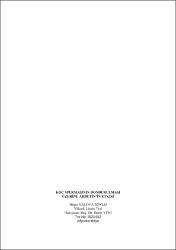Koç spermasının dondurulması üzerine arbutinin etkisi
Özet
Sunulan bu çalışma, dondurma çözdürme sonrası sperma sulandırıcısına ilave edilen bir antioksidan olan arbutinin spermatolojik, CASA (Computer-Assisted Sperm Analysis), oksidatif stres parametreleri ve DNA hasarı üzerine etkilerinin belirlenmesi amacıyla yapıldı. Afyonkarahisar koşullarında yetiştirilen Sönmez ırkına ait toplam 3 baş koçtan alınan spermalar birleştirilip 5 eşit hacme bölünerek kontrol başta olmak üzere farklı miktarlarda arbutin içeren Tris bazlı sulandırıcılar ile sulandırıldı. Sulandırılan örnekler 0,25 ml’lik payetlerde 5 °C’de 3 saat ekilibrasyona tabi tutulduktan sonra sıvı azot buharında donduruldu. Daha sonra sperma örnekleri inceleme gününe kadar sıvı azot tankında (-196°C) depolandı.
Çözdürülen spermalarda subjektif motilite ve CASA motilitesi açısından 2,5 mM arbutin içeren grup hem kontrol hem de diğer gruplara göre belirgin bir üstünlük sağladığı gözlenmiştir. VAP, VSL, VCL, ALH ve BCF parametreleri açısından en yüksek değerler 10 mM arbutin içeren grupta tespit edildi. Anormal spermatozoon orta kısım anomalilerinde ise 7,5 mM ve 10 mM’lık gruplardaki azalmanın diğer gruplar ve kontrol grubuna göre önemli (p<0,05) olduğu belirlendi. Kuyruk anomalilerine bakıldığında en düşük değer 2,5 mM’lık grupta bulundu ve 10 mM’lık grupla arasındaki farkın önemli (p<0,05) olduğu belirlendi. Spermatozoon HE test parametrelerinden en düşük membran bütünlüğü ve canlılığın (H+,E-) kontrol grubunda olduğu en yüksek değerin 7,5 mM’lık grupta olduğu ve aralarındaki farkın istatistiki olarak (p<0,05) önemli olduğu belirlendi. DNA hasarı 2,5; 5; 7,5 mM’lık gruplarda elde edilen değerler kontrol grubuna göre istatistiki olarak önemli (p<0,05) bulunmuştur. Oksidatif stres parametrelerinden MDA’nın 2,5 ve 5 mM’lık gruplarda belirlenen değerler 10 mM’lık gruba göre istatistiki olarak önemli (p<0,05) derecede düşük bulunmuştur. GSH parametresinde ise 10 mM’lık grupta belirlenen değer kontrol ve diğer gruplara göre istatistiki olarak farklı (p<0,05) bulunmuştur. Total antioksidan düzeyinde elde ettiğimiz en yüksek değer ile 7,5 ve 10 mM’lık grup ile aralarındaki fark (p<0,05) önemlidir. Total oksidan düzeyi ve oksidatif stres indeksi yönünden 10 mM’lık grubun kontrol ve diğer gruplar ile arasındaki farkın istatistiki olarak önemli (p<0,05) bulunduğu tespit edildi.
Sonuç olarak koç spermasının dondurulmasında antioksidan olarak kullanılan arbutinin motilite, CASA parametreleri, anormal spermatozoon oranı, membran bütünlüğü, oksidatif stres ve DNA hasarı üzerinde olumlu etkiler yarattığı anlaşılmış, ancak etkisinin daha geniş hayvan materyali kullanılarak dölverimi sonuçları ile birlikte değerlendirilmesinin yararlı olacağı kanısına varılmıştır. This study was conducted to determine the effects of arbutin, an antioxidant added to the sperm diluent after thawing, on spermological parameters, Computer-Assisted Sperm Analysis (CASA), oxidative stress parameters, and DNA damage. Sperm samples were collected from a total of 3 male goats of the Sönmez breed raised under Afyonkarahisar conditions. The samples were pooled and divided into 5 equal volumes, which were then diluted with Tris-based extenders containing different amounts of arbutin, including the control group. The diluted samples were subjected to equilibration at 5 °C for 3 hours in 0.25 ml straws before being frozen in liquid nitrogen vapor. Subsequently, the sperm samples were stored in a liquid nitrogen tank (-196°C) until the day of analysis.
In terms of subjective motility and CASA motility, the group containing 2,5 mM arbutin in the thawed sperm showed a significant superiority compared to both the control group and the other groups. The parameters VAP, VSL, VCL, ALH, and BCF exhibited the highest values in the group containing 10 mM arbutin. Regarding the midpiece abnormalities of the spermatozoa, a significant decrease was observed in the 7,5 mM and 10 mM groups compared to the other groups and the control group (p<0.05). When looking at tail abnormalities, the lowest value was found in the 2,5 mM group, and the difference between this group and the 10 mM group was significant (p<0.05). Among the HE test parameters of the spermatozoa, the lowest membrane integrity and viability (H+, E-) were observed in the control group, while the highest value was found in the 7,5 mM group, and the difference between them was statistically significant (p<0.05). The values obtained for DNA damage in the groups containing 2,5; 5, and 7,5 mM arbutin were statistically significant (p<0.05) compared to the control group. Among the oxidative stress parameters, the values of MDA (malondialdehyde) in the 2,5 and 5 mM groups were significantly lower (p<0.05) compared to the 10 mM group. In the GSH (glutathione) parameter, the value obtained in the 10 mM group was statistically different (p<0.05) from the control and other groups. The highest value obtained in the total antioxidant level showed a significant difference (p<0.05) with the 7,5 and 10 mM groups. In terms of total oxidant level and oxidative stress index, a statistically significant difference (p<0.05) was observed between the 10 mM group and the control and other groups.
In conclusion, it has been observed that arbutin, used as an antioxidant in the freezing of goat sperm, has positive effects on motility, CASA parameters, abnormal spermatozoa rate, membrane integrity, oxidative stress, and DNA damage. However, it is deemed beneficial to evaluate its effects along with fertility results using a wider range of animal samples.
Bağlantı
https://hdl.handle.net/11630/10316Koleksiyonlar
- Yüksek Lisans Tezleri [667]



















